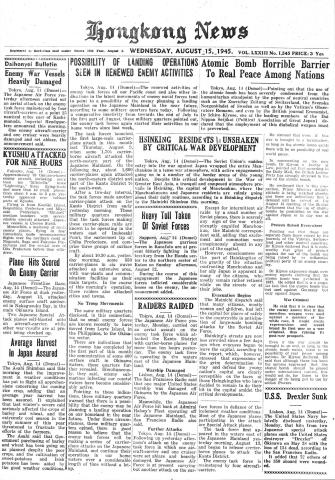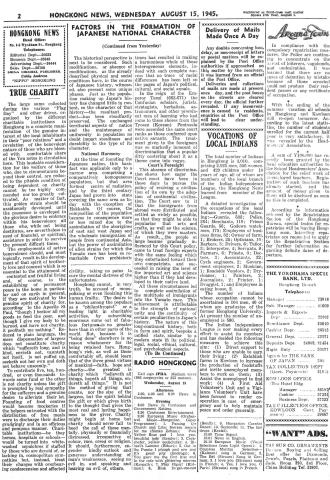After the War in Hong Kong
The war in the Pacific ended on August 15, 1945. The Japanese had surrendered after the dropping of two atomic bombs on the cities of Hiroshima and Nagasaki. Peace in Hong Kong meant no more air raids and lots of food to eat. During the war we survived on starvation rations and I still remember the physical pain in the stomach from lack of food.
When the British Fleet sailed into Hong Kong harbour, they brought back the rule of law. We no longer had to fear the arbritrary and savage behaviour of the Japanese army. To this day, the Chinese have not entirely forgiven the Japanese for the many atrocities committed during the long war and the occupation of much of China. This second Sino-Japanese War began officially in 1937 and ended in 1945.
My brother and I were enrolled in the Central British School when it reopened soon after the war. The school was later renamed the King George V school (KGV). It was a pretty good school at the time, but I was a lousy student. I think that was mainly due to the fact that I was, and still am, a lazy person. Mind you, I was about two years younger than most of my fellow students in my class and that could have been a problem. Two years difference in age at that stage of life was critical. When most of my coed fellow students were experimenting in the bushes, I was still reading "Biggles".
Some of our teachers were brilliant. I remember with great pleasure our English teacher, Conrad Watson; our French teacher, Mrs. Crosier; and our Math teacher, Gamble. I can only hope that I did not cause them too many heartaches with my poor behavior. I played hooky regularly, and was often in the art room, drawing and painting, when I should have been in geography or chemistry lessons. It was my last art teacher who put the apparently ridiculous idea into my head that I could study to become an artist, and for that I'm truly grateful. He told me that he could have arranged a place for me at the Central School of Art in London, but I explained to him then that our family was headed for Australia. Continue reading on Paul's website...


